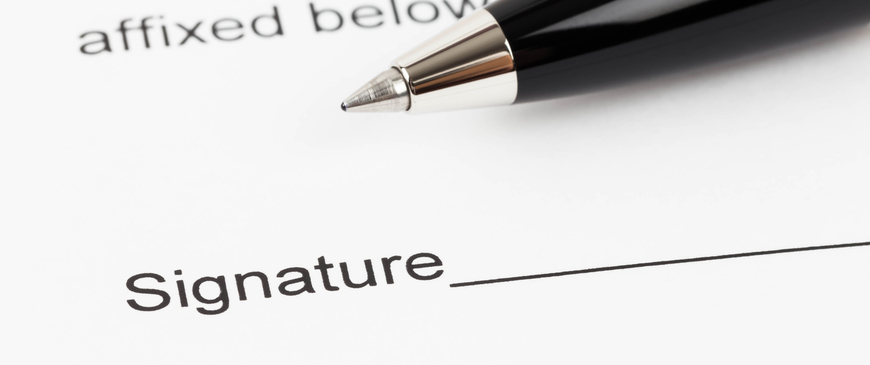
Five reasons why even a basic EU-UK trade deal is better than nothing
A deal would avoid tariffs, unlock supplementary benefits, allow for EU and UK customs co-operation, ensure the Northern Ireland protocol is implemented sustainably and provide a platform on which to build a deeper relationship in the future.
For businesses there is little difference between preparing to exit the transition period with an EU-UK free trade agreement in place and preparing to exit without one. As I highlighted in November 2019, the EU-UK free trade agreement envisioned by Prime Minister Boris Johnson still requires businesses to adapt to new customs procedures, regulatory requirements and restrictions on the provision of cross-border services. This has, belatedly, been acknowledged by the UK government, with the recent publication of its border operating model, which spells out all the things companies trading between the EU and UK will need to do, whether there is a trade deal or not. The EU, for its part, has always been upfront about the practical consequences of the UK exiting the single market and customs union. Furthermore, the macroeconomic impact of exiting the transition period with a free trade agreement is not very different from exiting without.
But there are still good reasons for Johnson and the European leaders to spend political capital on concluding a trade deal. Exiting the transition period at the end of the year with an EU-UK free trade agreement in place is still preferable to failing to reach an agreement. A free trade agreement would: prevent tariffs being levied on goods trade between the EU and UK; increase the chances of the EU unilaterally treating the UK’s financial services and data regimes as equivalent to its own; increase the scope for EU and UK customs authorities to co-operate to mitigate the day-one impact of exiting the transition period, and potentially introduce a further implementation period; create an environment conducive to the successful implementation of the Northern Ireland protocol; and provide a platform on which to build a more substantial EU-UK relationship in the future.
Exiting the transition period at the end of the year with an EU-UK free trade agreement in place is still preferable to failing to reach an agreement.
1. Duty-free and quota-free trade
An EU-UK free trade agreement will still result in new non-tariff, regulatory, barriers to trade. But the fact that it could remove all tariffs and quotas (so long as the products meet rules of origin requirements) is not to be sniffed at. For British exporters of products facing high tariffs, such as cars (10 per cent) and lamb (a chilled carcass faces a combined tariff of 12.8 per cent + €171.3/100kg), duty-and-quota-free trade is essential if they are to remain competitive. And while an agreement will not come close to replicating the near-frictionless trade the UK enjoyed as an EU member, it could take the edge off some of the new regulatory hurdles that will emerge. For example, it could reduce the rate of physical inspection at the border on products of animal origin from up to 50 per cent of consignments to near zero. A trade deal could also create a framework for the continued recognition of professional qualifications in both the EU and UK, and make it easier for people to fulfil short-term services contracts in both territories.
2. Supplementary benefits
The EU is yet to decide whether to allow businesses to conduct some EU-focused financial services out of the UK by granting the UK’s regulatory regime ‘equivalence’. It also needs to decide whether to recognise the UK’s data protection regime as ‘adequate’, and therefore whether to allow companies to continue storing the personal data of EU citizens on servers located in the UK. While these are unilateral decisions for the EU to take, and technically unrelated to the trade talks with the UK, political realities mean that the EU is much more likely to grant the UK equivalence and adequacy if there is also a free trade agreement.
3. Customs co-operation
A free trade agreement would probably include provisions that formalise co-operation between EU and UK customs agencies. It would also create a more positive working environment, rather than the inevitable animosity that would accompany failure to reach a deal. Customs co-operation would open up opportunities for both parties to work together on the ground to ensure that approaches are co-ordinated, information is shared, and that EU-UK borders do not grind to a halt on day one. The UK has already announced a series of unilateral measures to make customs simpler, such as making it possible for importers to defer submitting customs declarations for up to six months. But it would be more effective if these measures were co-ordinated with EU customs authorities.
It also remains possible that a free trade agreement could include a further implementation period. This could, for example, extend elements of the transition period such as the UK’s membership of the EU customs union and single market for goods for a further period of time and would not necessarily require the approval of member-state parliaments. While there are few senior voices in either the EU or UK advocating for such an approach, the fully-fledged rupture due on January 1st remains a political choice, not a technical or legal inevitability.
4. Northern Ireland Protocol
The Withdrawal Agreement’s Northern Ireland Protocol is legally binding on both parties whether or not there is an agreement between the EU and UK on the future relationship. But in practice the protocol’s successful implementation requires the EU and UK to work together. In order to prevent the need for a land border between Northern Ireland and Ireland, the protocol stipulates that goods entering Northern Ireland from Great Britain or elsewhere and at risk of onward transport into the EU are to be treated as if they are entering the Union, and as such are subject to EU border controls. But these checks will not be carried out by EU officials. UK officials and agencies will be tasked with enforcing EU rules when appropriate. It is difficult to see how this arrangement could survive a presumably acrimonious failure to conclude a trade agreement.
An EU-UK free trade agreement could also minimise the need for strict controls on a number of goods entering Northern Ireland from the rest of the UK. The EU is concerned that foreign goods subject to lower UK tariffs will enter the EU via Northern Ireland either directly, or incorporated as inputs into other products, giving these goods an unfair competitive advantage over EU-produced alternatives. With a free trade agreement, the actual risk of unfair competition is removed so long as the UK also matches the EU tariff on imports from the rest of the world. Unfortunately, the UK has needlessly created a problem for itself here by marginally tweaking many of its external tariffs to be slightly lower than the EU’s, meaning the EU would need to agree to tolerate minor differences.
It is quite possible that a future UK government will not share the ideological hang-ups of the incumbents and will seek to improve the relationship where possible.
5. A platform on which to build in future
Any agreement that the EU and UK negotiate in time for the end of the year will not be the final word on the relationship. Inevitably it will evolve over time, and the existence of a free trade agreement, however basic, provides a foundation on which to build. It is quite possible that a future UK government will not share the ideological hang-ups of the incumbents and will seek to improve the relationship where possible. Beyond trade, for example, it would be unsurprising if a future government wanted the UK to be covered by European Health Insurance Cards, like other non-EU European nations such as Switzerland and Liechtenstein. But such agreements are easier if there is already a relationship structure in place. Some Brexit supporters do not want a deal between the EU and UK, and instead prioritise a trade agreement with the US, precisely because they believe it will guard against future UK re-integration with the EU.
Concluding an EU-UK agreement on the future trading relationship before the end of the year will require compromises from both sides of the sort I have outlined in previous CER publications (here and here). Ideally the EU and UK would reach a more comprehensive agreement, also covering research, social security co-operation and justice and home affairs (as well as foreign and security policy, which the UK has so far refused to discuss at all). But even if that proves impossible, and even though the end of the transition period will bring big changes and disruption for many people and companies no matter what, a deal is still worth fighting for.
Sam Lowe is a senior research fellow at the Centre for European Reform.

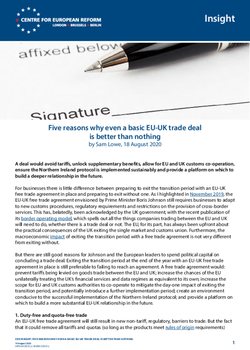
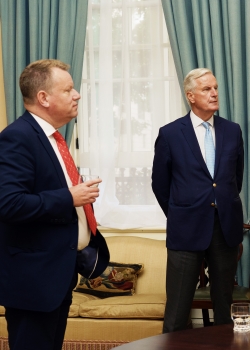

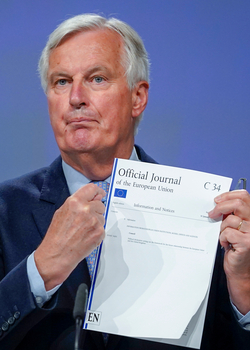
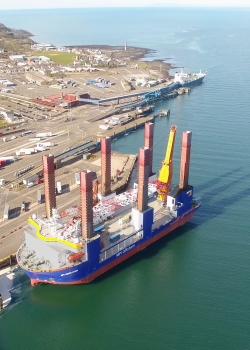
Add new comment